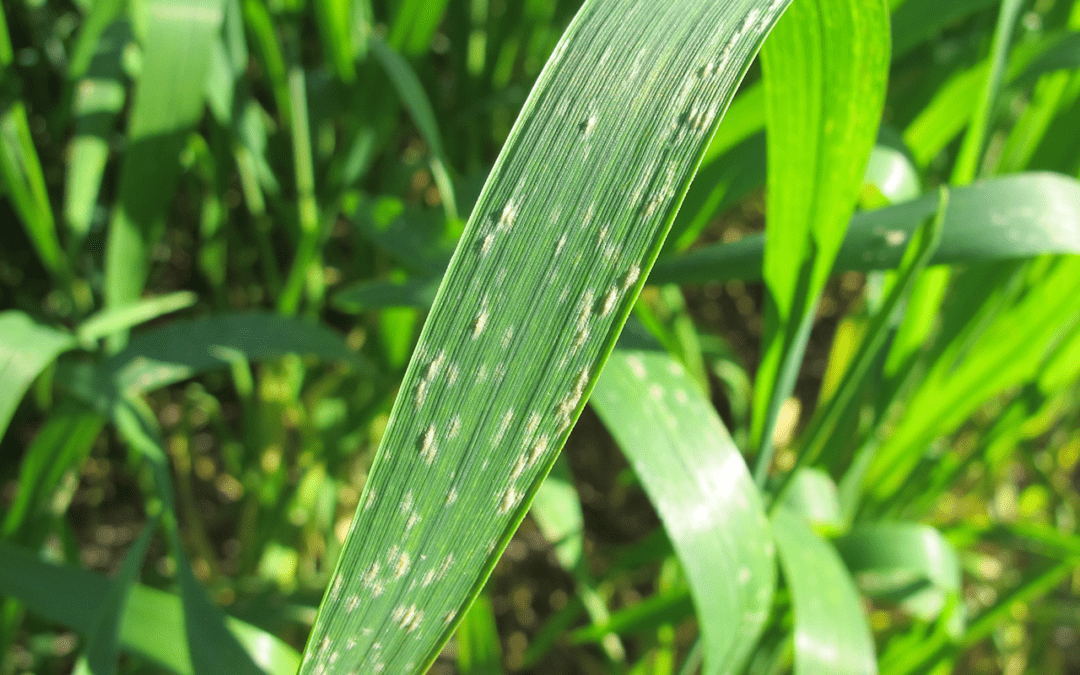
The powdery mildew fungus can cause significant yield loss in wheat. Photo: GRDC
AUSTRALIAN grain producers will have more tools in their tool kits to help protect crops and improve profitability and sustainability with the approval of new permits issued by the federal regulator to help manage and control fungicide-resistant powdery mildew in wheat.
Grain Producers Australia provides these permits to support growers and industry through the emergency and minor use program managed by Australia’s federal regulator, the Agricultural Pesticides and Veterinary Medicine Authority.
These emergency and minor use permits support the grains industry’s capacity to respond swiftly and effectively to manage pests, weeds and crop diseases when needed, in grain producing regions.
GPA acted on a request from Grain Producers SA, through its recently established Crop Disease Roundtable, to address this rapidly emerging issue and seek the permits for growers.
Supported by the Grains Research and Development Corporation’s minor-use program, GPA has now successfully applied for three new permits that will help manage shifts in fungicide sensitivity, and resistance to both Group 3 and Group 11 fungicides.
The permits are for Proquinazid and Quinoxefen, both Group 13 fungicides, and Metrafenone from Group U8, giving growers an alternative effective mode of action, to protect their crops.
Fungicide resistance develops
GPA grower director, RD&E spokesperson and Victorian grain producer Andrew Weideman said the wheat powdery mildew pathogen has developed resistance to QoI (Group 11, strobilurin) and DMI (Group 3, triazole) fungicides.
Mr Weidemann said resistance to both fungicide groups have been found at high frequencies across wheat growing regions of New South Wales, Victoria, Tasmania and South Australia.
He said these detections are based on fungicide sensitivity studies led by Fran Lopez-Ruiz based at the Curtin University Centre for Crop and Disease Management.
“These new permits issued by the APVMA will help give growers access to a timely option to help manage a problem in their paddock and protect the bottom line of their business,” Mr Weidemann said.
“This is typical of the work GPA does responding to issues in the paddock to find solutions, which often goes unnoticed but delivers real value for growers and our industry.
“We’re grateful to other industry members in helping to support this industry good outcome; especially GPSA and GRDC.”
Permit benefits
Recent analysis by GPA said the benefit of about 160 current separate grains industry permits, for pulses, oilseeds and cereal crops, delivers about $12M annual benefit, and up to $218M benefit from reduced crop losses in years of significant pestulance due to rainfall, such as seen in 2022-23.
GPA’s permit to give growers access to double-strength zinc phosphide mouse bait (ZP50) products is another example of these real benefits in the paddock and back pocket, with a more effective tool to control mouse plagues and save profits.
GPSA grower director Nick Hillier chaired the Crop Disease Roundtable, and said the process of gaining an emergency-use or minor-use permit was an important step in crop protection in Australia.
“This system allows an issue like fungicide resistant disease to be identified and dealt with quickly in order to minimise the loss of crop yield to the Australian grain producer,” Mr Hillier said.
“GRDC plays a pivotal role in the process and together with the product registrants, they generate additional trial data to support the establishment of further permits or the possible registration of the product.”
GPSA established the Crop Disease Roundtable after concerns were raised about the impact of disease on crops from South Australian grain producers following a wetter than usual season.

HAVE YOUR SAY